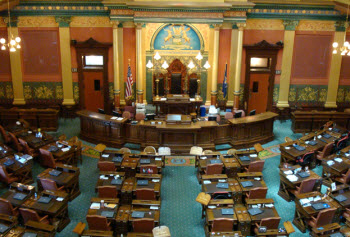Gay and abortion rights laws at issue in Michigan
Debate over gay and abortion rights has been percolating in the Michigan Legislature and courts for years. Here are some key issues and legislation that have framed the debate:
Gay marriage ban: In November 2004, state voters approved a constitutional ban against same-sex marriage. The ban will remain in effect unless voters choose to undo the ban in the Constitution, or the ban is ruled unconstitutional. Federal judges have struck down gay-marriage bans in a number of states, and a federal judge is currently holding a trial in downtown Detroit on its constitutionality in a lawsuit brought by two female Oakland County nurses. Gay rights advocates say that they are prepared to move forward with a petition drive seeking to amend the Constitution in 2016 should the court not rule in their favor.
Domestic partner benefits: Public Act 297 of 2011 prohibits most public employers (schools, cities, etc.) from offering domestic partner benefits to unmarried couples. Since gay and lesbian marriages are banned, the law effectively prevents an Michigan employee's same-sex partner from receiving health coverage as part of his or her benefits. The benefits law doesn't apply to universities because they are overseen by autonomous boards.
Last June, a federal judge issued a preliminary injunction blocking the law while a court challenge is heard. On Feb. 14, lawyers for Gov. Rick Snyder filed a motion asking the judge to uphold the benefits ban, which Snyder said eliminates irrational and unfair programs and is financially sound. No hearing date has been set.
Same-sex couple adoption: Michigan's adoption law only allows for joint adoptions or second-parent adoptions (someone adopting a partner’s child) by married couples. Gays can adopt individually, but their partner generally lacks legal standing as a parent. This can be an especially significant problem when the legal parent (biological or adoptive) dies or the couple separates, and the partner has no custody rights. Supporters of Michigan’s current law say children are best served in homes with a father and mother.
The prohibition on gay adoption is also being challenged in the court case brought by the Oakland County nurses, who are in a longstanding relationship and individually adopted three special needs children (one child by one partner, two by the other). They sued for the right to adopt each other's children. On the judge’s recommendation, the couple expanded the suit to challenge the constitutional ban on gay marriage. A trial on these issues is playing out this week in U.S. District Court in Detroit.
Employment and housing protection: Under Michigan law, individuals can be fired or denied housing because they are gay. That's because sexual orientation is not protected by the state's Elliott-Larsen Civil Rights Act, which currently bans discrimination on the basis of race, gender and other classifications.
Legislation has been proposed (for instance by state Rep. Rebekah Warren, D-Ann Arbor in 2012) to bar discrimination based on sexual orientation, but supporters have so far been unable to prevail. Republican House Speaker Jase Bolger has said he would like to find a way to address the issue but is struggling to find the balance between the rights of the gay and lesbian communities and religious rights. The ACLU of Michigan has been working with Bolger as well as some state businesses to find a solution.
It is not yet clear what impact the recent controversy in Arizona will have on the debate in Michigan. Last week, Arizona Gov. Jan Brewer vetoed legislation that would have given businesses the right to effectively refuse service to gays and others based on religious objections. The bill’s demise was notable for the near-universal opposition to the legislation mounted by mainstream Republicans and the business community in Arizona, and through much of the nation.
Meanwhile, about 30 Michigan cities and townships have approved local ordinances barring discrimination based on sexual orientation.
Abortion insurance rider: The Michigan Legislature last year enacted legislation to bar insurance plans from covering most abortions, unless women or their employers buy a separate abortion rider. Women who did not separately purchase the rider wouldn't be covered even in cases of abortion and incest, which has caused some opponents to call it "rape insurance." Supporters of the new law say businesses and companies shouldn’t have to pay for a procedure they oppose. Governor Rick Snyder vetoed the measure initially, but supporters were able to get around that by collecting signatures for a citizens' initiative, which isn't subject to a veto. Public Act 182 of 2013 takes effect March 14.
Abortion regulations: House Bill 5711, the legislation that stirred the "Vaginagate" controversy, would among other things require many abortion providers to operate in more costly freestanding surgical facilities and prohibit the dispensing of abortion medication (abortion pills) through telemedicine. Supporters say the measure includes necessary regulations to protect women against substandard medical practices and to prevent coercion. Opponents say it is all part of a strategy to limit abortion and drive abortion providers out of much of the state. After Snyder signed the bill into law, he called the decision one of the most difficult he has made since taking office.
See what new members are saying about why they donated to Bridge Michigan:
- “In order for this information to be accurate and unbiased it must be underwritten by its readers, not by special interests.” - Larry S.
- “Not many other media sources report on the topics Bridge does.” - Susan B.
- “Your journalism is outstanding and rare these days.” - Mark S.
If you want to ensure the future of nonpartisan, nonprofit Michigan journalism, please become a member today. You, too, will be asked why you donated and maybe we'll feature your quote next time!


 The Michigan Legislature has drawn scrutiny for laws restricting the rights of gays and access to abortion services. (Bridge file photo)
The Michigan Legislature has drawn scrutiny for laws restricting the rights of gays and access to abortion services. (Bridge file photo)